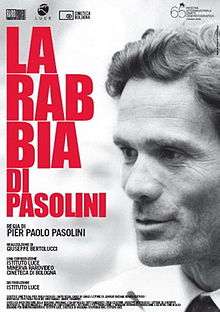La rabbia
| La rabbia | |
|---|---|
 | |
| Directed by | Pier Paolo Pasolini, Giovannino Guareschi |
| Produced by | Gastone Ferranti |
| Written by | Giovannino Guareschi, Pier Paolo Pasolini |
| Screenplay by | Pier Paolo Pasolini, Giovannino Guareschi |
| Story by | Pier Paolo Pasolini, Giovannino Guareschi |
| Starring | Pier Paolo Pasolini |
| Narrated by | Giorgio Bassani, Renato Guttuso (Pasolini's segment); Carlo Romano, Gigi Artuso (Guareschi's segment) |
| Edited by | Nino Baragli, Pier Paolo Pasolini |
Release dates | 1963 |
Running time | 104' |
| Country | Italy |
| Language | Italian |
La Rabbia ("Anger") is an Italian documentary film produced by Gastone Ferranti and directed by Pier Paolo Pasolini in the first half and by Giovannino Guareschi in the second half.
Film producer Gastone Ferranti wanted to make a movie with the two most important Italian intellectuals of the 1960s: Giovannino Guareschi and Pier Paolo Pasolini, despite them being diametrically opposite - one a right-wing Monarchist, and the other a Communist militant, and yet branded as "heretics" by their own side. The producer's goal was to make a sort of "match" where Guareschi and Pasolini gave their own answers to a single question, i.e. what was the cause of the discontent, of the fear and of the conflicts shaking the society of the time. The movie, analyzing the social conflicts of the contemporary world in a strongly critical and controversial way, was made through the montage of old footage from Ferranti's Mondo Libero newsreels, archive material concerning different countries, pictures from art books and magazines. Guareschi criticizes the degradation of art for commercial aims, and more broadly the "soulless" modernity wiping out any perspective other than materialism and, lastly, causes distrust towards the future. However, as Guareschi says at the end, "This is the planet where the Son of God chose to be born, to suffer and to die as a man." And for this reason "it's here, and not on the Moon, that we have to try and find the solution to our problems. Because in spite of Mao, Khruschev and other trouble, this planet is still worth living on [...] and hope is greater than fear in us."
In his part of the documentary, Pasolini deals with the 1956 Hungarian Revolution and of the Cuban Revolution, praises progressivism, decolonization and class struggle, he takes Marilyn Monroe's death as an example to speak about the death of beauty, complains about the disappearance of the rural world and heavily criticizes industrialization, conservativism, anti-communism and the burgeoisie. Part of Pasolini's film was cut to make room for Guareschi in the final cut.
Despite starting from opposite positions, Guareschi's and Pasolini's statements have some points of convergence, especially regarding the alienation and de-humanization in the modern world. It might even seem that both turned out to be prophetic, although in a negative way.
The film came out in 1963, but it was withdrawn from theatres just a few weeks later. The reason for this disappearance is not clear, however it might be conjectured that the victory of "reactionary" writer Guareschi was feared to cause such a scandal to bring about Ferranti's financial ruin. Pasolini's half had a limited circulation in later years, while Guareschi's half disappeared completely.
It was not until the 65th Venice Film Festival to see Pasolini's film being brought back into the light, restored and in an "extended director's cut" version. Giuseppe Bertolucci, the director of the restoration project, justified the absence of Guareschi's half by defining his statements on decolonization and on the Algerian War "intolerable". At the time Bertolucci was also the head of the committee for the celebrations of the centennial of Guareschi's birth: following his declarations, he obviously had to resign.[1] Once the controversy blew over, Rage was shown at the "Fiuggi Family Festival" the following year, with both Guareschi's and Pasolini's part, to great acclaim of the public.
External links
La rabbia at the Internet Movie Database